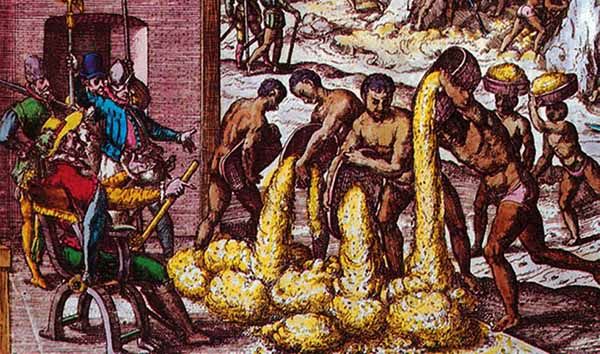
Following the introduction by the group, New Extractivism of the 21st Century: 10 Urgent Theses by Eduardo Gudynas, neo-extractivism as defined by Gudynas is different from extractivism because “the state is much more active, with rules that are much clearer (regardless of whether they are good or not), and not necessarily oriented to serve “friends” of political power”. As we are post- pink tide, and many extractive sites have come into contention and beyond contradiction versus the state and the public, was this a new form of extractivism (capitalist accumulation) or rather just a primer toward entering neoliberal development with enough commodity for international trade? As states like Ecuador, Brazil, and even Venezuela were proponents of this state control around natural resources for its development, they still allowed multinational corporations to provide the infrastructure and purchase the raw materials extracted. The following pieces I will present in this blog question whether there is actually something new about this form of extractivism.
Gudynas notes that “while the old extractivism pointed toward “exports” or “the world market,” the progressive governments have replaced that discourse with one that points to “globalization” and “competition.” According to Professor Dennis Canterbury, the recognition that these states had enough natural resources to trade as an alternative, maybe considerable ethical capitalism, is a political farce. In his text, Neoextractivism and Capitalist Accumulation, Professor Canterbury argues that “the crisis and reform” of capitalist development through a world-systems theoretical approach best describes what neo-extractivism is trying to present. Instead, Canterbury is interested as these countries as periphery to the Global North and does the genealogical work of tying capitalist accumulation to continued colonial relations. He is invested in complicating how a natural resource is defined via anti-colonial struggle, which also seemed to remedy unfree labor established by colonialism. Canterbury uses Guyana as his site of intervention, as the Caribbean country also has ‘natural’ resources that global capitalism has already situated as what Guyana needs to exploit for development. Canterbury asks us to be careful with interchanging terms and instead focus on how neoliberal capitalism reinvents itself to the demands of globalization.
Canterbury, D. C. (2018). Neoextractivism and Capitalist Development. United Kingdom: Taylor & Francis.

In his piece “Extractivism and neoextractivism: two sides of the same curse” Alberto Acosta, Ecuadorian economist, asks those who also use the term to be critical of fetishizing processes of capitalist accumulation as novice to neoextractivism. In particular, he is focused on understanding the role of deterritorialization vis a vis the state, in relationship to capitalist development and accumulation. He argues that there is no way that these governments that promote El Buen Vivir that have yet to decolonize their relationship with natural resources, because deterritorialization from extractivism has long lasting effects that would be seen as counter, or rather another decimation via colonial capitalist modernity.
Acosta, Alberto. “Extractivism and neoextractivism: two sides of the same curse.” Beyond development: alternative visions from Latin America 1 (2013): 61-86.
Two pieces ask for us to expand our understanding of extractivism instead of embracing #neoextractivism. Veronica Gago and Sandro Mezzandra, in their piece, ” A Critique of the Extractive Operations of Capital: Toward an Expanded Concept of Extractivism,” call for us to think about finance and financialization as a different realm to think through extractivism- the continued element of this is also debt. The work supports Acosta’s view, which calls for the end of consumption and overproduction as a sign of modernity and instead continued indoctrination into neoliberal globalization.

Verónica Gago & Sandro Mezzadra (2017) A Critique of the Extractive Operations of Capital: Toward an Expanded Concept of Extractivism, Rethinking Marxism, 29:4, 574-591, DOI: 10.1080/08935696.2017.1417087
IF modernity depends on extractivism, then cultural studies should be isolated as a point of study and struggle. Authors Aikio and Cortes-Servino in their article, “Cultural studies of extraction” claim that, “extractivism’ is increasingly understood also as an analytical and also political concept that enables the examination and articulation of deeper underlying logics of exploitation and subjectification that are central to the present conjuncture of capitalist globalization and neoliberalism.” Morever, extractivist logics know no limit in what can be or should be extracted. The space to nuance this within cultural studies adds a layer of the ability to contextualize and discern contradictions within development, accumulation, and extractived material. Using cultural studies for the authors just allows for room to develop additional methodologies and analytical frameworks meant to protect future and uphold an anti-extractivist world. Although not mentioned in the piece, cultural studies is a great place to understand societal relations, like migration, in relationship to extractivism. Cultural studies can also provide testimony or witness to the violence and harm created by extractivist projects.
Laura Junka-Aikio & Catalina Cortes-Severino (2017) Cultural studies of extraction, Cultural Studies, 31:2-3, 175-184, DOI: 10.1080/09502386.2017.1303397

